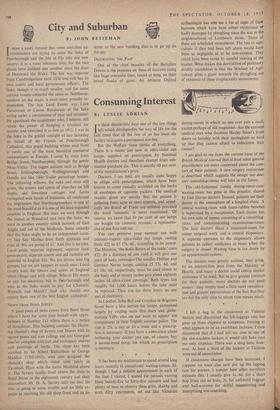Consuming Interest
By LESLIE ADRIAN
N these democratic days one of the few things left which distinguishes the way of life for the rich from that of the rest of us has been the facility to acquire a permanent sun-tan.
But the Welfare State thinks of everything. There is a boom just now in ultra-violet sun lamps, supplied on prescription by National Health doctors and therefore exempt from sub- stantial purchase tax. This is usually 60 per cent. of the manufacturer's price.
Doctors, I am told, are usually quite happy to oblige with prescriptions, which have been known to come casually scribbled on the backs of envelopes or cigarette packets. The medical reasons given are usually that the patient is suffering from acne or semi-antemia, and appar- ently the Board of Trade are satisfied provided the word `cosmetic' is never mentioned. 'Of course, we know that 99 per cent, of our lamps are bought for cosmetic reasons,' a representa- tive of one firm told me.
You can preserve your summer tan with • mercury-vapour ultra-violet ray lamps costing frotb £22 to £5 17s. 6d., according to its power. The Hanovia, `the Rolls-Royce of the trade,' costs £22. At a distance of one yard it will give one yard of body coverage■The smaller Phillips and German Neron lamps, costing £5 17s. 6d. and £5 18s. 6d. respectively, must be used closer to the body and at twenty inches give about eighteen inches of ultra-violet coverage. Both types last roughly for 1,000 hours before the tube must be replaced. They run for three hours on one unit of electricity.
In London, John Bell and Croydon in Wigmore Street have a hire service for lamps, patronised largely by visiting male film stars and globe- trotting VIPs who do not want to appear too conspicuous in their English summer pallor. The rate is 25s. a day or £4 a week and a prescrip- tion is necessary. If. you have a conscience about bothering your doctor you can, of course, buy a second-hand lamp, for which no prescription is necessary.
It has been my misfortune to spend several long hours recently in consultants' waiting-rooms. Al-. though I had a definite appointment in each of the four I visited, I waited for periods varying from twenty-five to forty-five minutes and had plenty of time to observe these grim, shabby and even dirty apartments, set out like Victorian archwologist has sent me a list of eight of these barrows which have been either obliterated or badly damaged by ploughing since the war in the neighbourhood of Lambourn alone. Three of these are scheduled monuments. The loss to agri- culture if they had been left alone would have been so negligible as to be non-existent. They could have been saved by careful steering of the tractor. What makes this destruction of prehistorY doubly scandalous is that the Minister of Agri- culture gives a grant towards the ploughing out of existence of these irreplaceable monuments.
dining-rooms in which no one ever eats a meal, except perhaps of old magazines. Are the eminent medical men who decorate Harley Street's front doors so lavishly with their nameplates so hard up that they cannot afford to redecorate their rooms?
I am glad to see from the current issue of the British Medical Journal that at least some general practitioners are more concerned about the com- fort of their patients. A new surgery conversion is described which suggests the design our doc- tors' consulting-rooms will take in the future.
The Sold-fashioned family dining-room-cum- "waiting-room has gone in this practice, shared by four Dorset doctors. Instead, patients see their doctor in the atmosphere of a hospital clinic. A central waiting-room with foam-rubber benches is supervised by a receptionist. Each doctor has his own suite of rooms, consisting of a consulting- room and communicating examination-room. The four doctors share a treatment-room for minor surgical work and a central dispensary. A separate entrance to the dispensary allow patients to collect medicines at. times when the surgery is closed. Waiting -time is cut down by an appointments system.
The doctors were greatly assisted, they write, by an interest-free loan from the Ministry of Health; and many a doctor could obtain similar assistance if he tried. But to give greater comfort for their patients, many doctors do not need money : they simply need a little more considera- tion and greater appreciation of the fact that they are not the only class to whom time means much.
* * I left a bag in the cloakroom at Victoria Station and discovered the left-luggage rate has gone up ftom sixpence to ninepence. Fuming at what appears to be an exorbitant increase, I then discovered that if I had left my case in one of the slot-machine lockers it would still have cost me only sixpence. There was a snag here, how- ever. At least a third of the lockers at Victoria were out of commission.
If cloakroom charges have been increased, I suppose we must also now put up the tipping rate for porters. I wonder how other travellers estimate this. I usually give Is. 6d. for a short hop from cab to train, 2s. for awkward luggage and half-a-crown for skilful manceuvring and enterprising seat-searching.


































 Previous page
Previous page